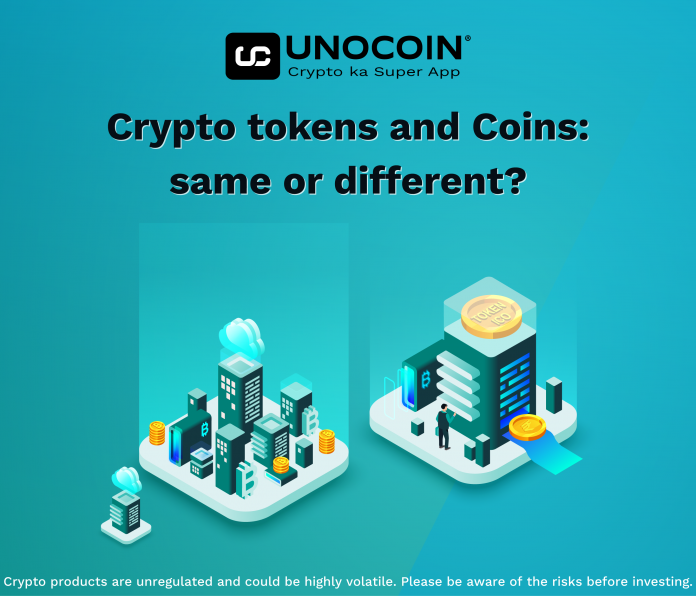Understanding the Differences Between Crypto coins and Cryptotokens
Crypto tokens and crypto coins, also known as cryptocurrencies, are digital assets that have gained popularity in recent years. Although they share some similarities, they differ in use cases and underlying technology. In this article, we will explore the differences between crypto tokens and crypto coins and provide examples of each.
Crypto coins, also known as cryptocurrencies, are digital assets that use proprietary blockchain technology. Bitcoin, the first and most famous cryptocurrency, was created in 2009 and uses a decentralized peer-to-peer network for transactions. Other examples of crypto coins include Ethereum, Litecoin, and Bitcoin Cash. These coins have their own independent network and can be used as a means of payment, a store of value, as well as to create smart contracts and decentralized applications.
For example, Bitcoin is a decentralized digital currency that enables peer-to-peer transactions without the need for a central authority. Transactions are recorded on the Bitcoin blockchain, which is a public ledger managed by a network of users. Bitcoin can be used to buy goods and services, or it can be traded on cryptocurrency exchanges for other currencies.
Similarly, Ethereum is a decentralized platform that enables the creation of smart contracts and decentralized applications (dApps). The Ethereum network uses its own cryptocurrency Ether (ETH) as a means of payment for transaction fees and as fuel for the network. Developers can also use Ether to create their own tokens on the Ethereum blockchain through a process called “tokenization”.
Crypto Tokens :
On the other hand, crypto tokens are digital assets that are built on existing blockchain technology such as Ethereum. They use the underlying blockchain infrastructure to function and rely on the underlying blockchain for their security. These tokens are created through a process called “tokenization” and can be used for a variety of purposes, such as representing a digital asset, a utility, or representing a physical asset. Examples of crypto tokens include ERC-20 tokens, which are built on the Ethereum blockchain, and Binance Coin (BNB), which is built on the Binance chain.
Examples of such Tokens :
For example, ERC-20 tokens are a specific type of token that is built on the Ethereum blockchain. They follow a set of rules and standards that make them interchangeable and easily portable. This has led to the creation of many different ERC-20 tokens, each with its own unique use case. Some examples include Tether (USDT), which is pegged to the value of the US dollar, and Chainlink (LINK), which is used to connect smart contracts to real-world data.
Another example of a crypto token is Binance Coin (BNB). Binance Coin is a native token of the Binance exchange and can be used to pay transaction fees on the Binance platform. Binance Coin holders also get discounts on trading fees when BNB pays for them. Additionally, Binance Coin can be traded on Binance and other cryptocurrency exchanges.
Conclusion:
In short, crypto coins are independent digital assets that have their own blockchain, while crypto tokens are built on top of existing blockchain technology and rely on the underlying blockchain for security. Crypto coins can be used as a means of payment, a store of value, and also to create smart contracts and decentralized applications. On the other hand, crypto tokens have a wide variety of use cases, such as representing a digital asset, a utility, or representing a physical asset. Both crypto tokens and crypto coins have their own set of advantages and disadvantages, and it is important that investors understand the differences and evaluate the potential risks and rewards before making an investment.
Please find the list of authentic Unocoin accounts for all your queries below:
- YouTube Channel: https://www.youtube.com/c/Unocoin/videos
- Newsletter: https://medium.com/subscribe/@Unocoin_growth
- Blogs: https://blog.unocoin.com
- Instagram: https://www.instagram.com/unocoin/
- Twitter: https://twitter.com/Unocoin
- Facebook: https://www.facebook.com/unocoin/
- LinkedIn: https://in.linkedin.com/company/unocoin
- Telegram Group: https://t.me/Unocoin_Group
- Telegram Channel: https://t.me/+fasQhTKBsfA5N2Zl
- Telegram: https://t.me/UnocoinSupport_Bot
- E-mail id: [email protected]
- Contact details: 7788978910 (09:30 AM IST – 06:30 PM, Mon – Sat)
- App store link: https://apps.apple.com/us/app/unocoin/id1030422972?ls=1
- Playstore link: https://play.google.com/store/apps/details?id=com.unocoin.unocoinwallet
Disclaimer: Crypto products are unregulated as of this date in India. They could be highly volatile. At Unocoin, we understand that there is a need to protect consumer interests as this form of trading and investment has risks that consumers may not be aware of. To ensure that consumers who deal in crypto products are not misled, they are advised to DYOR (Do Your Own Research).




